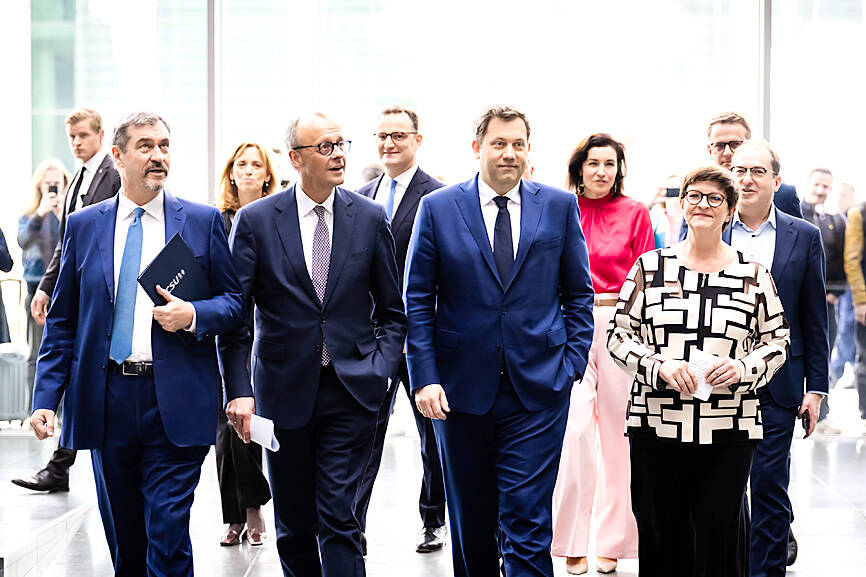Germany’s next leader, the conservative Friedrich Merz, vowed on Wednesday to “move the country forward again” by boosting the economy and defense as he presented a deal to launch his coalition government by early next month.
Merz is set to take over as leader of Europe’s top economy just as US President Donald Trump has sparked global trade turmoil and raised deep fears about transatlantic security ties.
Asked at a news conference if he had a message for Trump, Merz said in English that the country would meet its defense obligations and rebuild its economic competitiveness.

Photo: EPA-EFE
“Germany is back on track,” he added.
Following the February election victory of his Christian Democratic Union/Christian Social Union of Bavaria (CDU/CSU) alliance, Merz quickly struck a deal to forge a new government with the center-left Social Democratic Party (SPD) of the now-caretaker Chancellor Olaf Scholz.
“The coalition agreement is a signal of a new beginning... for our country,” said Merz, whose party won the elections with 28.5 percent of the vote.
In their 144-page coalition contract, the two parties pledged to “significantly” boost defense spending amid growing concerns about US commitment to European security under Trump.
The parties also said Germany would continue to support Ukraine as the US looks to encourage a deal to end the war started by Russia’s invasion over three years ago.
“We will provide comprehensive support to Ukraine so that it can effectively defend itself against the Russian aggressor and assert itself in negotiations,” the agreement said.
Presenting the deal, Merz pledged that Germany would “reform and invest to keep Germany stable, make it safer and make it economically stronger again,” adding that “Europe can rely on Germany.”
He also pledged that his government would “largely end irregular migration” and promised a “repatriation offensive” after an election campaign marked by a bitter debate on migration and a surge in support for the far-right Alternative for Germany (AfD).
The swift conclusion of the talks — a process that has in past years dragged on for months in Germany — is the result of “extraordinary external pressure,” said political scientist Wolfgang Schroeder of Kassel University.
“The pressure is coming from Trump, the pressure is coming from the AfD, the pressure is coming from [Merz’s] own ranks,” he told news channel NTV.
The far-right AfD came second in February’s election with a record 20 percent of the vote.
Support for the party has since continued to rise, with one survey by the Ipsos polling firm released on Wednesday rating it as Germany’s most popular party at 25 percent — ahead of the CDU/CSU at 24 percent.
Under the coalition deal, the conservatives are set to take over the foreign and economy ministries, while the SPD would get finance and defense, with German Minister of Defense Boris Pistorius widely expected to retain his position.
While the SPD plans to ask its members to sign off on the final deal, the CDU plans only to seek the approval of senior party figures.

Taiwan is projected to lose a working-age population of about 6.67 million people in two waves of retirement in the coming years, as the nation confronts accelerating demographic decline and a shortage of younger workers to take their place, the Ministry of the Interior said. Taiwan experienced its largest baby boom between 1958 and 1966, when the population grew by 3.78 million, followed by a second surge of 2.89 million between 1976 and 1982, ministry data showed. In 2023, the first of those baby boom generations — those born in the late 1950s and early 1960s — began to enter retirement, triggering

One of two tropical depressions that formed off Taiwan yesterday morning could turn into a moderate typhoon by the weekend, the Central Weather Administration (CWA) said yesterday. Tropical Depression No. 21 formed at 8am about 1,850km off the southeast coast, CWA forecaster Lee Meng-hsuan (李孟軒) said. The weather system is expected to move northwest as it builds momentum, possibly intensifying this weekend into a typhoon, which would be called Mitag, Lee said. The radius of the storm is expected to reach almost 200km, she said. It is forecast to approach the southeast of Taiwan on Monday next week and pass through the Bashi Channel

NO CHANGE: The TRA makes clear that the US does not consider the status of Taiwan to have been determined by WWII-era documents, a former AIT deputy director said The American Institute in Taiwan’s (AIT) comments that World War-II era documents do not determine Taiwan’s political status accurately conveyed the US’ stance, the US Department of State said. An AIT spokesperson on Saturday said that a Chinese official mischaracterized World War II-era documents as stating that Taiwan was ceded to the China. The remarks from the US’ de facto embassy in Taiwan drew criticism from the Ma Ying-jeou Foundation, whose director said the comments put Taiwan in danger. The Chinese-language United Daily News yesterday reported that a US State Department spokesperson confirmed the AIT’s position. They added that the US would continue to

The number of Chinese spouses applying for dependent residency as well as long-term residency in Taiwan has decreased, the Mainland Affairs Council said yesterday, adding that the reduction of Chinese spouses staying or living in Taiwan is only one facet reflecting the general decrease in the number of people willing to get married in Taiwan. The number of Chinese spouses applying for dependent residency last year was 7,123, down by 2,931, or 29.15 percent, from the previous year. The same census showed that the number of Chinese spouses applying for long-term residency and receiving approval last year stood at 2,973, down 1,520,